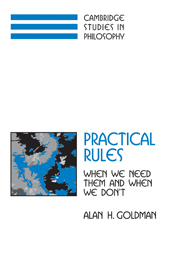4 - Moral Reasoning without Rules
Published online by Cambridge University Press: 23 July 2009
Summary
A reader might have predicted that this final chapter would be titled “Practical Reasoning without Rules.” But there are good reasons for focusing on moral reasoning here. As hinted in Section II of Chapter 2, I do not believe that much prudential reasoning actually occurs, at least not of the complex and interesting variety that will be the target of explication here. When faced with conflicting self-interested motivations and pondering what to do, we typically simply summon the various considerations before our minds and await recognition of their relative weights. At least this is what we do after critically informing our desires, if necessary, as to their origins and the consequences of acting on them. This description is similar to the particularist's account of moral reasoning, which I will challenge. Moral reasoning is instead similar in structure to legal reasoning, although the databases from which these two types of reasoning proceed are different. Not being a lawyer, I will concentrate on moral reasoning here for my examples.
In Chapter 1, I argued that ordinary moral reasoning does not consist in deducing particular prescriptions from rules. Rules cannot capture our ordinary moral judgments. The reason emphasized there was the complex ways that numerous morally relevant factors interact in various contexts, reversing priorities among them and sometimes their positive or negative values as well. There are no sufficient conditions that tell us, for example, when not lying is more important than not causing harm and when not causing harm is more important.
- Type
- Chapter
- Information
- Practical RulesWhen We Need Them and When We Don't, pp. 149 - 184Publisher: Cambridge University PressPrint publication year: 2001



